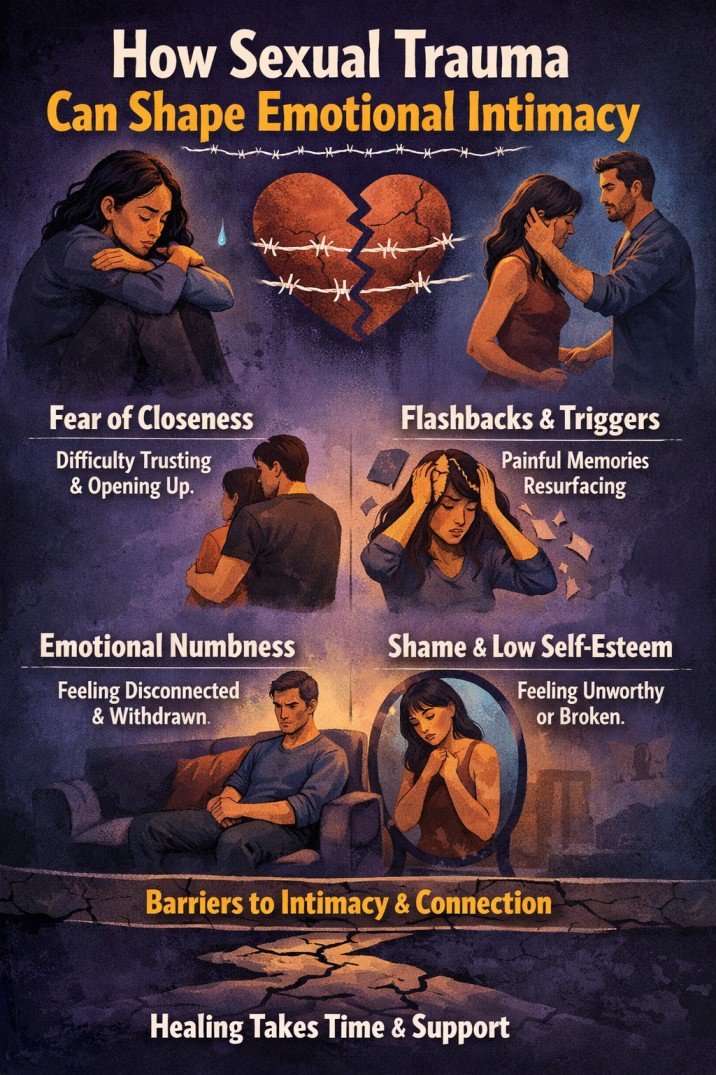Sexual trauma doesn’t stay in the past once a romantic relationship begins. Even when the experience happened years earlier, its effects can quietly shape intimacy, trust, and emotional closeness.
In relationships, sexual trauma often shows up in unexpected ways. Closeness may feel comforting one moment and overwhelming the next. Desire can fluctuate without a clear reason. Boundaries may feel hard to explain, both to a partner and to oneself.
These experiences can be confusing for both people. Survivors may feel guilty or broken for struggling with intimacy. Partners may feel unsure how to offer support without making things worse. Over time, this confusion can create distance, even in relationships built on care and commitment.
This article focuses specifically on how sexual trauma can affect romantic relationships, including dating and marriage. Rather than offering steps or fixes, it explores common relational patterns, the impact on emotional and physical intimacy, and why healing inside a relationship often unfolds unevenly and slowly.
When Sexual Trauma Enters a Romantic Relationship
Sexual trauma doesn’t always show itself at the beginning of a relationship. Often, it appears later, once trust, closeness, or emotional safety starts to deepen.
At first, things may feel normal. Connection grows, intimacy builds, and the relationship seems secure. Then, certain moments begin to feel unexpectedly difficult. Physical closeness may suddenly bring discomfort. Emotional vulnerability may trigger withdrawal. Reactions can feel confusing, even to the person experiencing them.
Inside a relationship, trauma often surfaces in response to safety, not danger. As closeness increases, the nervous system may react in ways that don’t match the present moment. What feels loving to one partner can feel overwhelming to the other, without a clear explanation.
This can be hard for both people to understand. Survivors may wonder why they are struggling now, especially if the trauma feels “long ago.” Partners may feel blindsided, unsure what changed or how to respond. Without context, these shifts can be misread as loss of interest, rejection, or emotional distance.
Recognising that sexual trauma can emerge within a relationship, rather than before it, helps explain why many couples feel close yet disconnected at the same time.
How Sexual Trauma Can Shape Emotional Intimacy
Emotional intimacy is often affected just as deeply as physical closeness, sometimes even more. Sexual trauma can quietly change how safe it feels to be emotionally open, vulnerable, or dependent within a relationship.

Closeness Can Feel Inconsistent
Some people notice that emotional closeness feels welcome one moment and overwhelming the next. Opening up may feel comforting at first, then suddenly triggering or exposing. This shift can happen without warning, and often without a clear explanation.
Guarding Feelings Without Realising It
Others remain present in the relationship but keep emotional distance without intending to. Conversations may stay practical or surface-level, while deeper feelings feel harder to access or express. This isn’t a lack of care, but a way of staying emotionally regulated.
Push–Pull Patterns Can Develop
These experiences can create a confusing dynamic between partners. One person may reach for closeness, while the other pulls back. Then the pattern reverses. Both may feel unsettled, unsure what changed or why connection feels unstable.
Conflict and Vulnerability May Feel Risky
Moments that require emotional exposure, disagreements, reassurance, or difficult conversations can feel especially challenging. Withdrawal in these moments is often misread as avoidance or disinterest, when it may actually be a protective response.
Why This Often Gets Misunderstood
Over time, emotional distance can be mistaken for a lack of love. Silence may be read as withdrawal. What’s often happening instead is an internal effort to stay safe while remaining connected.
Understanding how sexual trauma can shape emotional intimacy helps explain why affection and struggle can exist side by side in the same relationship, even when both partners genuinely care.
How Sexual Trauma Can Affect Physical Intimacy Without Warning
Physical intimacy can feel unpredictable in relationships shaped by sexual trauma. It isn’t always absent, and it isn’t always distressing. More often, it changes in ways that feel confusing to both partners.

Desire Can Fluctuate Suddenly
Intimacy may feel comfortable and connected at times, then difficult or overwhelming at others. These shifts don’t always follow a clear pattern. Desire may fade quickly, return unexpectedly, or feel disconnected from emotional closeness altogether.
Touch Can Carry Mixed Signals
Certain forms of touch may feel safe one day and uncomfortable the next. Even gentle or affectionate contact can trigger a sense of unease without a clear reason. This inconsistency often leaves both partners unsure of what feels okay to initiate or receive.
The Body May React Before the Mind Does
Sometimes the response isn’t emotional but physical. Tension, shutting down, or feeling distant during intimacy can happen automatically, even when there is trust and care. These reactions are often confusing, especially when there is no conscious fear present.
Guilt and Pressure Can Enter the Relationship
Survivors may feel guilty for pulling away or saying no. Partners may worry about causing harm or being rejected. Over time, intimacy can become surrounded by unspoken pressure, where both people want closeness but feel unsure how to approach it.
Why This Is Often Misread
Changes in physical intimacy are frequently interpreted as loss of attraction or interest. In reality, they are often protective responses rather than a reflection of desire or commitment.
Understanding that physical intimacy can be affected unevenly and without warning helps reduce blame and confusion, making space for patience and clearer communication within the relationship.
Why Healing Looks Different Inside a Relationship
Healing from sexual trauma is often described as a personal journey, but relationships change that reality. When healing happens alongside a partner, progress is shaped not only by internal experiences, but by shared moments, expectations, and emotional timing.
Healing Is Influenced by Another Person’s Presence
Inside a relationship, healing doesn’t happen in isolation. Emotional safety can increase because of connection, but vulnerability can also feel more intense. Being seen, desired, or depended on can bring comfort and pressure at the same time.
Progress May Trigger New Reactions
Moments that look like improvement from the outside can feel unsettling on the inside. Increased closeness, trust, or stability may surface fears that weren’t present before. This can make healing feel uneven, even when the relationship itself is supportive.
Setbacks Don’t Mean Regression
In relational healing, difficult moments often follow positive ones. This doesn’t mean progress is lost. It usually reflects how the nervous system adjusts in layers, responding differently as the relationship deepens or changes.
Partners Heal at Different Speeds
One partner may feel ready to move forward emotionally or physically, while the other needs more time. This difference in pace can create tension, not because either person is wrong, but because healing doesn’t follow a shared timeline.
The Partner’s Experience, Often Overlooked in Relationships
Sexual trauma affects relationships on both sides, not just the person who experienced it. Partners may notice changes in closeness or intimacy without fully understanding why, which can lead to confusion or self-doubt.
Many partners feel unsure how to support without causing harm. They may hold back affection, questions, or their own needs out of fear of triggering discomfort. Over time, this uncertainty can create emotional distance, even when care and commitment remain strong.
When the partner’s experience goes unspoken, misunderstandings can quietly grow. Recognising that both people are affected in different ways helps reduce isolation and keeps the relationship from carrying the impact of trauma in silence.
Moving Forward Together After Sexual Trauma
Sexual trauma can change how closeness feels inside a relationship, but it doesn’t erase the possibility of connection. Moving forward together often means allowing the relationship to evolve rather than trying to return to how things were before.
Progress inside a relationship is rarely steady or predictable. There may be moments of closeness followed by distance, comfort followed by hesitation. These shifts don’t mean something is failing, they reflect how safety and trust rebuild at their own pace.
What helps most is not rushing the process or trying to fix what feels broken, but creating space where both partners can be honest about their experiences. When understanding replaces pressure, and patience replaces expectation, connection has room to grow in ways that feel sustainable for both people.
Healing within a relationship is not about perfection. It’s about learning how to stay present with each other, even when the path forward isn’t clear.




